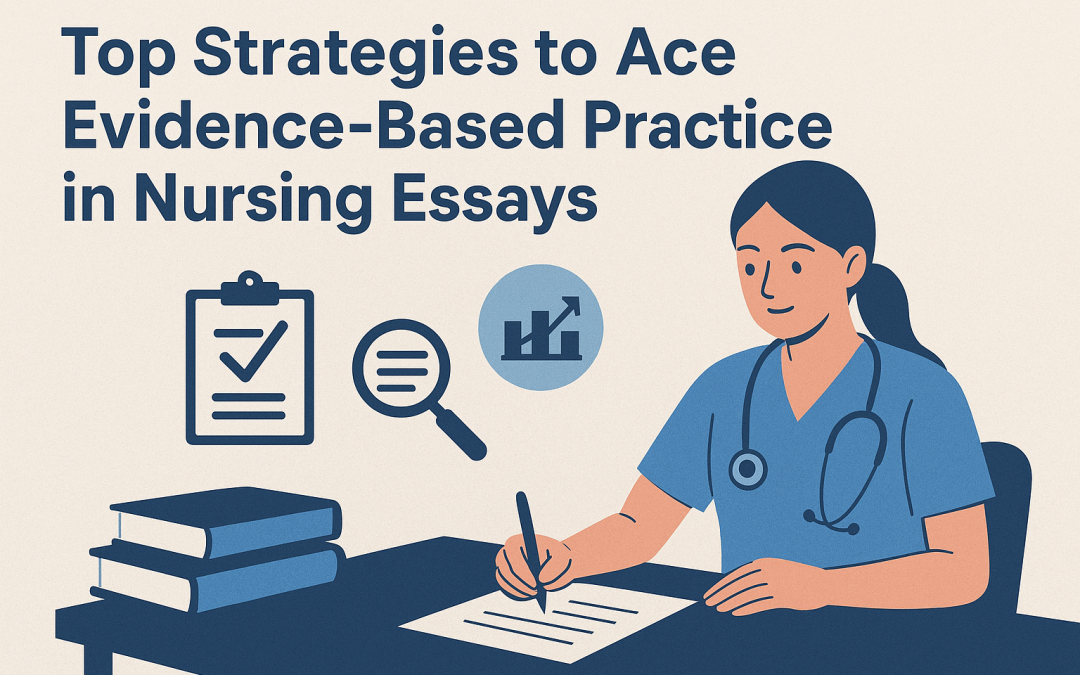Introduction
Evidence-based practice is the essence of nursing essays. It is not about piling random studies into a Word File and hoping your teacher sees brilliance where there’s chaos. Instead, your nursing essay is all about accumulating credible studies by doing in-depth research, clear reasoning, and organized yet well-structured writing, without sounding like you’ve copied half of PubMed. Done right, these essays show not only that you can find information, but also that you can interpret and apply it to real-world nursing practice.
This go-to guide will give you practical nursing essay writing tips, letting you actually use them between classes and clinical rotations. You can take it as your roadmap to turn medical evidence into a polished, professional piece of writing that your professor and your future self will thank you for. Keep reading!
Nursing Essay Writing Tips for Evidence-Based Practice
Understand the Assignment Before You Begin
Jumping into research without reading and understanding what the topic is about and what your professor wants you to submit is the first mistake students make.
Before you start work, check the following:
- The essay type: Check if your essay is analytical, argumentative, a case study, or a literature review?
- Word count and referencing: Check what referencing style your essay demands: APA, Harvard, or MLA. Make sure you’re aware of this before you start writing.
- Special requirements: Some professors may require a certain number of peer-reviewed sources. They may also want you to add specific sections like methodology and discussion.
In case of unclarity, ask your professor. You can save yourself hours of rewriting later with just a 10-minute clarification.
Start with a Clear Research Question
A good research question is your essay’s GPS, keeping you from wandering off into unconnected territory. Following the PICO framework (Population, Intervention, Comparison, Outcome) is among the best nursing essay writing tips because it is a reliable approach to form one.
Example: Don’t ask the broad “Nurses and patient care.” Instead, ask: “How does hourly rounding impact fall rates in elderly patients compared to standard care?”
With this, you can narrow your focus while making finding pertinent studies much easier.
Find Quality Sources, Not Just Convenient Ones
Quality matters in evidence-based practice; it beats quantity every time. Integrating information from ten high-quality peer-reviewed studies is far more valuable than fifty questionable sources, like blog posts.
Pro Tip: A trusted online essay writing service can assist you in identifying and using the right ones.
Best platforms to search:
- PubMed – A goldmine for medical and nursing research.
- CINAHL – Specializes in nursing and allied health literature.
- Government health statistics – Reliable and often up to date.
Avoid:
- Generic health blogs (unless written by recognized professionals).
- News articles with sensational headlines.
- Wikipedia as a main source (fine for quick overviews, not citations).
Write your essay in a way that portrays it as a professional nursing journal. If you do this, you’re on the right track. Otherwise, you need to reassess your sources to make your essay a scholarly document.
Read with a Critical Eye
Just stacking quotes is not a good approach. In evidence-based writing, it is essential to make sense of research, and your argument must reflect the logic.
Note the following when reviewing studies:
- Actual findings/results: What did the author or researcher actually discover?
- Limitations: Was the study included small sample sizes, partial data, or lack of control groups?
- Relevance: Does the study you selected directly connect to your research question?
This step is essential, showing that you’re interpreting evidence, not just accumulating it like souvenirs.
Nursing Essay Examples for Learning
Find well-structured nursing essay examples to get practical insights into:
- The way of presenting data without irritating the reader.
- The way the researcher keeps the balance between his/her voice and cited evidence.
- The way to ensure effective transitions between sections.
Remember that nursing essay examples are only for reference; they are not blueprints. Plagiarism is a serious offense, so avoid copying. In fact, in a nursing school, plagiarism is about as welcome as a wrong medication dose.
Avoid Common Mistakes That Sink Essays
Avoid common mistakes because even well-researched essays can be derailed.
Watch out for:
- Outdated and unrelated sources: Medical research and guidelines change fast. In most cases, studies done 5–7 years ago may be outdated and unrelated unless it’s a landmark study.
- Overusing quotes: Your writing should reflect your understanding and strong grip on the relevant research.
- Weak evidence links: Statistic requires explanation. So, if you include any data, explain precisely how it backs your argument.
Think of your essay like a patient chart: clear, logical, and written for someone who might be seeing this information for the first time.
Balance Evidence with Your Own Analysis
Research is the backbone of your essay, but your interpretation is what makes it meaningful. One of the top nursing essay writing tips is a good analysis; without it, your work becomes just a pile of other people’s words.
Ask yourself:
- What does this mean for nursing practice?
- Is the evidence strong and applicable?
- Does it align with my overall thesis?
Suppose you find that hourly rounding works well in reducing patient falls. Now, you should also discuss the reason that might be the case and how you can implement it in a real-world hospital environment.
Use Proper Referencing and Citation
Some students consider formatting as just a formality. Referencing with proper citation is a significant part of academic integrity. Follow the rules consistently, whether it’s APA, Harvard, or MLA, stick to the rules consistently.
Pro tip: You can use citation tools like Zotero, EndNote, or Mendeley. These tools help you keep everything organized, saving you from stress for missing page numbers or misplaced commas in references.
And yes, if you find yourself requesting someone, “please write my annotated bibliography”, know that this feeling is common among nursing students.
Consider Professional Guidance When Needed
Sometimes, your best time management skills do not make a difference; you simply can’t do it all. It is especially when you’re balancing coursework with clinical shifts. If you face this situation, you can find a reputable nursing essay writing service that can help you in:
- Proofreading and editing.
- Accessing model essays for reference.
- Getting recent, credible sources.
Just steer clear of services promising “100% guaranteed A+ in under an hour.” Remember that this is exactly wrong. It is not sustainable or safe.
Use Campus and Online Resources
The following free, high-value support is available to students, and most of them overlook it.
- University writing centers: This resource can help with structure, clarity, grammar, and overall organization.
- Librarians: This resource is skilled in helping you locate reliable and related research quickly.
- Peer feedback: This resource includes classmates who can give you fresh perspectives, helping you find unclear sections.
It is advisable to explore online essay writing comparison sites to get nursing essay examples for reference. Along with this, you can also evaluate an online essay writing service to make sure that you are working with the right service or you find valuable resources that support your learning, not replace your effort entirely.
Final Word
An evidence-based nursing essay demands good planning, high-quality yet authentic sources, and thoughtful analysis. This way, it becomes easy to transform research into persuasive, professional writing.
By following nursing essay writing tips as top strategies shared earlier, you can get the grades you want, but most importantly, you can strengthen your ability to interpret and apply evidence in your nursing career later. In nursing essays, the right evidence applied in the right way is key to winning.



